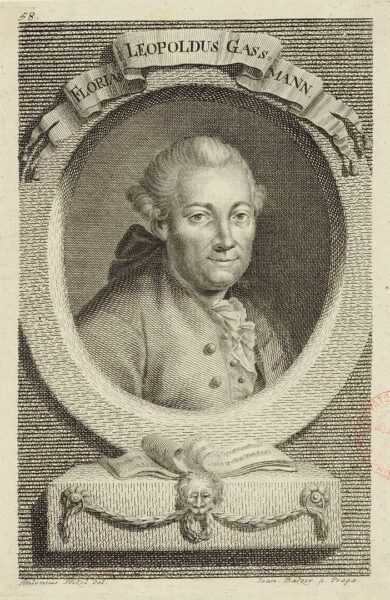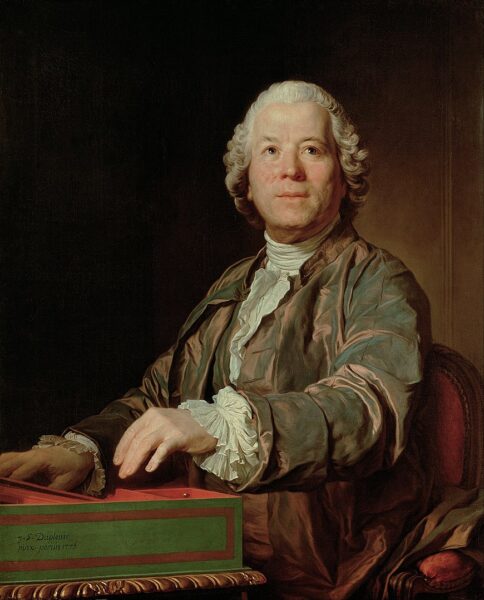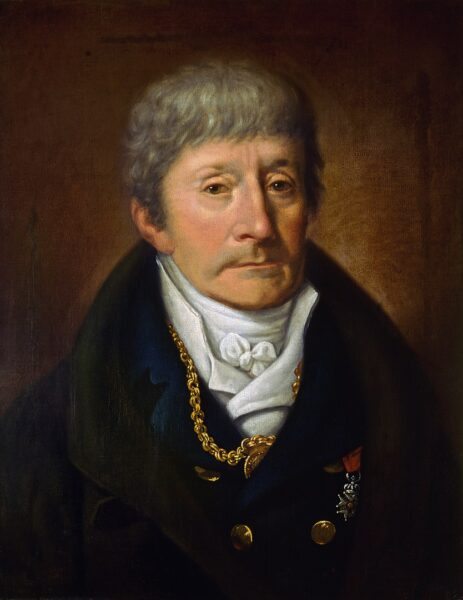Here’s a short list of people who got it wrong: Alexander Pushkin; Nikolai Rimsky-Korsakov; Peter Shaffer; Miloš Forman. Prepare to see Antonio Salieri in a new light.
Youth
While he might not have been a prodigy, Antonio Salieri was certainly a talented musician from an early age. Born in 1750 in Legnago, Italy, and, inspired by his brother Francesco, he began studying music at an early age. Sadly, by 1764, Salieri was an orphan.
In 1766 he was living in Venice as the ward of a nobleman named Giovanni Mocenigo and continuing his musical studies with the opera singer Ferdinando Pacini. Pacini introduced Salieri to Florian Gassman

(Wikimedia Commons – Public Domain)
who was, at the time, the chamber composer for the Habsburg emperor Joseph II. Gassman was sufficiently impressed that he brought Salieri to Vienna and not only continued his musical education but soon had the young Italian regularly performing in the chamber concerts that accompanied the Emperor’s evening meals.
Steps forward then back in Vienna
Salieri lived with Gassman until the latter’s death in 1774 and soon thereafter took over many of Gassman’s teaching duties ultimately counting Beethoven, Schubert, and Meyerbeer among his students. Early in this period of his life he became an assistant court composer for Joseph II. Although a man of the Enlightenment, who expanded public education, integrated Jews into Austrian society, and who issued a 1782 edict stating that ‘all our subjects, without distinction of nation and religion…should enjoy a legally guaranteed freedom,’ Joseph was also authoritarian and autocratic. Like his employer, Salieri was liberal in his views but, unlike Mozart, he was unquestioningly deferential to authority.
Salieri’s career suffered something of a setback when Joseph decided to end the performance of Italian opera, French spoken drama, and ballet replacing it with German Singspiel instead. This was very much a style that didn’t fit with Salieri’s compositional or linguistic strengths. (Salieri spoke but apparently never mastered German and, near his death is reported to have said, “I have only been in Germany for over fifty years. How could I have learned the language already?”)
At the combined urging of Joseph II and Christoph Willibald Gluck,

(Christoph Willibald Gluck – Wikimedia Commons – Public Domain)
who had become a close friend of Salieri’s during those early chamber concerts, the emperor granted Salieri leave from the court to travel to Milan to compose the debut opera for a new opera house – Nuovo Regio Ducale Teatro alla Scala that would open on 3 August 1778. (In a 2004 celebration when it re-opened after a period of extensive renovation, La Scala revived that very Opera – Europa reconosciuta.)
Vienna – Paris – Vienna 1780-1788
Emperor Joseph called Salieri back to Vienna in 1780 and commissioned him to compose a Singspiel for his new national company which the Italian composer did with the highly successful Der Rauchfangkehrer.
(Interestingly, the only other truly successful Singspiel from that time was Mozart’s Die Entführung aus dem Serail. This is another place Amadeus gets it wrong. There was no imperial debate about language and it’s almost certain that this story would have been familiar to anyone at court.)
In 1784, Salieri’s friend Gluck had been commissioned to compose a work for the Paris Opéra based on the myth of the Danaides but Gluck’s health was failing and he first requested Salieri’s help then, as his health worsened, turned the commission over to him. The Opéra initially resisted but accepted the change after Joseph II’s intervention largely through his sister Marie who was married to Louis XVI. The finished work, Les Danaïdes was described as a sensation when it premiered in 1784. A 2019 article in The New Yorker magazine described it as
having stark harmonies and solemn ensembles paid homage to Gluck, while its Italianate strains brought a new flavor to French tragic opera. This deft cosmopolitanism was Salieri’s major contribution to music history, preparing the way not only for Mozart’s mature operas but also for Rossini.
After Salieri’s return to Vienna, Joseph II would raise him to the position of Hofkapellmeister or court composer for the Imperial Chapel. It was during this period that Salieri convinced the emperor to name Lorenzo Da Ponte as the court poet. (Da Ponte would not only collaborate with Salieri but with Mozart for whom he wrote the librettos for La Nozze di Figaro, Don Giovanni, and Così Fan Tutte. In his memoirs, Da Ponte had great praise for Mozart’s music but equally lauded Salieri’s humanity calling him, “a most cultivated and intelligent man . . . whom I loved and esteemed both out of gratitude and by inclination . . . more than a friend, a brother to me.”)
Why then the lack of recognition?
It should be clear that Salieri was both accomplished and highly respected but, unlike several of his contemporaries and even some of his students, his fame faded. Why? As noted above, Emperor Joseph II was a man of the Enlightenment but he was also a German. He created a National Theater in the late 1770s intending to promote German-language plays and musical productions that reflected German values and tradition. In short, he was a nationalist. Although he lived in Vienna longer than Mozart, Beethoven, and Brahms, Salieri

(Wikimedia Commons – Public Domain)
had the misfortune of having been born in Italy. The German musicologist Timo Jouko Herrmann suspects that nationalism indeed played a significant role played in the marginalization of Salieri’s reputation. He wrote,
The cosmopolitan composer, fluent in Italian, German and French and artistically significant in all three linguistic areas, could not be fully absorbed in any European nation. With the emergence of nation-states, the historical Salieri gradually became a homeless figure, and his great artistic and social merits eventually fell into oblivion.
Another factor that contributed to diminishing his reputation could have been Joseph II’s death in 1790. This deprived Salieri of his greatest champion. Joseph’s successor Leopold II didn’t share Joseph’s Enlightenment views and this put Salieri at odds with his new employer.
Finally, the world and music were rapidly changing. Napoleon was rampaging across Europe and, with Beethoven’s rise, musical tastes were changing too quickly for Salieri to adapt. He wrote, “From that period, I realized that musical taste was gradually changing in a manner completely contrary to that of my own times. Eccentricity and confusion of genres replaced reasoned and masterful simplicity.” In 1804, his last effort at Singspiel – a form with which he had never been comfortable – had been a complete flop.
He withdrew from public like and lived the last two decades of his life in some obscurity and rather alone after the deaths of his only son Alois in 1805 and his wife Theresia in 1807.
Thus, rather than finding Salieri among those honored in the musical section of Ehrengräben of Vienna’s Zentralfriedhof, one must walk along the cemetery’s perimeter to find his grave nestled between the painter Joseph Klieber and the physician Franz von Wirer.